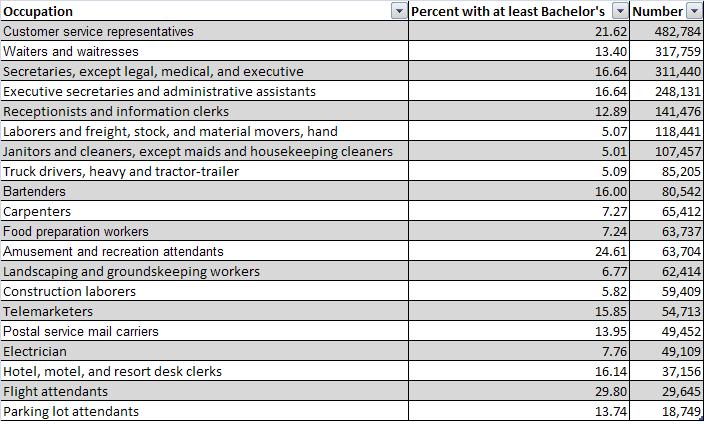
By Laura Schluckebier from HackCollege
Gizmodo posted an interesting article earlier this week that says that at least 5,000 janitors working in America have PhDs. Whoa.
The article goes on to essentially say that the amount of effort and money that students put into their college careers do not yield the same returns once they have graduated-- not even close. This seems to be evidenced in the charted information the chart of jobs and education from the Bureau of Labor Statistics, which I've displayed below.

Statistics like these are enough to make any college student nervous and question how their hard-earned higher education is going to help them when they're booted out into the real world. While there could be several possible explanations to account for some of these high numbers (recent graduates working lower-skilled jobs until they find a job in their field, PhDs and other degrees that are lacking quality, etc), it's worth discussing among college students to see if there is a way to avoid being a statistic.
What this information says to me is it is becoming increasingly important for students to be more than students. An education only gets you so far. You won't be taking midterms and writing analytical essays for the rest of your life. It's important to network so that you form connections with important people who can help you after college to get started in your career. Go to alumni connections or get-togethers that your university offers. You're bound to find someone in your field of interest who has graduated from your university. Alumni can be extremely useful network builders. Use them to start your career connections early in your college career so you're not stranded when you leave the college bubble.
It's also important to apply to internships both during the summer and during the school year. The point here is to not simply load up your resume with internship after internship, but to get experience to flesh out your student complexion. The knowledge you get from sitting in a classroom and doing research will only get you so far. At HackCollege, we know exactly how important internships can be. They're invaluable not only in the experience that they can give you, both in your field of interest and simply working in a professional atmosphere, but in the additional connections they can give you. Your summer internship may not lead to a career after college, but the contacts you've made there may prove to be extremely helpful.
While there's nothing that you can do to ensure that you'll have a fool-proof, career-guaranteed post-graduate experience, there are certain things you can do to help. As unfortunate as the Dr. Janitor paradox is, it makes us aware of some flaws in the higher education system. Even though we can't solve those problems overnight, expanding your experience as a student can help at least put you ahead of the pack.
What do you think about these statistics about higher education and low-skill employment? What are some issues you think there are with higher education? Let us know in the comments!